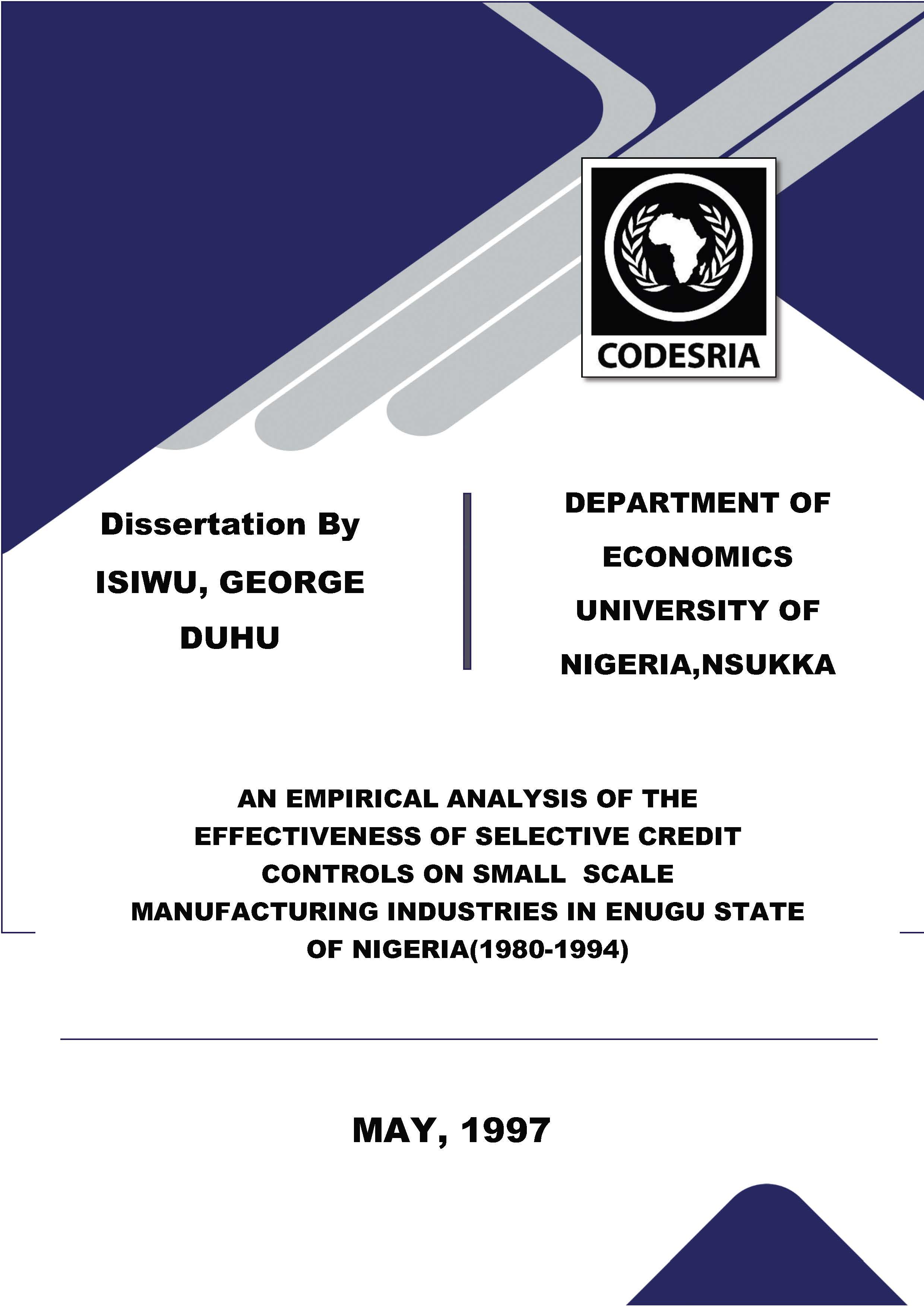AN EMPIRICAL ANALYSIS OF THE EFFECTIVENESS OF SELECTIVE CREDIT CONTROLS ON SMALL SCALE MANUFACTURING INDUSTRIES IN ENUGU STATE OF NIGERIA(1980-1994)
Keywords:
MANUFACTURING INDUSTRIES, SELECTIVE CREDIT CONTROLS, ENUGU STATE, NIGERIASynopsis
This study is motivated by the recent emphasis by the Federal Government of Nigeria on the promotion of small-scale Industries as a strategy for self-reliant industrialisation. The Central Bank of Nigeria (CBN) issues guidelines to banks to ensure that at least 20 per cent of their total loans and advances are allocated to these enterprises in the country. Yet, Small-scale manufacturing industries in Enugu State of Nigeria still face a high rate of business failures. Hence, the need for this study. This study is limited to six small-scale manufacturing industries in Enugu State that are registered with Enugu State Ministry of Commerce and Industry (Funds for small scale industries Unit) and the National Association of Small-Scale lndustrialists, (NASSI) Enugu. Their choice for this study is guided by the data availability during the period covered. To analyse the data,linear reggression applying Ordinary least squares (OLS)technique was adopted to test the parameter estimates. The empirical results show that there is credit rationing to these enterprises sampled and the impact of rationing on their total gross investment is significant. It is also found that selective credit controls, through which credit rationing cornes into effect, is ineffective in influencing their investment activity.
Downloads
References
Anderson, D. (1982), "Small Industry in under-developed Countries: A Discussion of Issues", Journal of World Development, 10, 11 (Nov. 1982),· · 913-48. ·
Azzi, C.F. and Cox, J.C. (1976), "A theory and test of Credit Rationing", American Economie Review, 66, 3, (Dec. 1976),911-17.
Bitros, G.C. (1981), "The fungibility factor in credit and the question of the efficacy of selective credit control", Oxford Economie Papers, 33,3 (Nov. 1981), 459-576.
CBN (1993), Monetary and credit Policy Guidelines (Moüetary Policy Circular No. 27).
Egwuatu, O.C'. (1988), "The Effectiveness of Institutional credit to small-scale industries in Nigeria (1970-86)", Unpublished B.Sc. Thesis submitted to the.•Department of Economies, University of Nigeria, Nsukka.
Federal Ministry of Industry and Technology (1992), Industrialisation in Nigeria: A Hand-book, (Lagos: Sahel publishers). ·
Freimer, M. and Gordon, M.J. (1965)) "Why Banks Ration Credit",Quarterly Journal of Economies 79, 1 (Feb.·1965), 3997-416.
HodI:,wan, D.R. (1960), "Credit risk and credit rationing", Quarterly Journal of Economies, 74, 1 (Feb. 1960), 258-75
Ikpeze, N.I. (1986), "Public Policy on small-Business: Three Unusual Perspectives", A paper presented at UNNUNLIOS 1986 Joint Workshop.
Inang, E. E. and Ukpong, G.E. (1992), "A Review of sma1l-scale Enterprises credit delivery strategies in Nigeria", CBN Economie and Financial Review, 30, 4 (Dec. 1992), 249-78.
Jaffee, D.M. ap.d Modigliani, F. (1969), "ATheory and test of credit rationing", American Economie
Revicw, 59, 4 (Sept. 1969), 850-72.
Meyer, P. A. (1986), Money, Financial Institution,and Economy,(Homewood: Irwin Publishers).
Modigliani, F. (1963), "The m,,onetary mechanism and its interaction with real phenomena", A Review of Economies and statistics,(Feb. 1963), 79-107.
Mqlho, L.E. (1986), "Interest rates, savings m1d Investment in Developing countries: A Re-examination of Mckinnpn-Shaw Hypothesis", lMF Staff Papers, 33, 1.., 90-116.
Obi, A.W. ((1987) "Prospective for small-scale Industries Development under a structural Adjustment Programme. The case of Nigeria", Paper presented at the 1987 conference on Adjustment, De industrialisation and urban crisis, Senegal.
Okigbo, P.N.C. (1981) Nigerian Financial System: Structure and Growth (London: Longman Group Ltd.).






